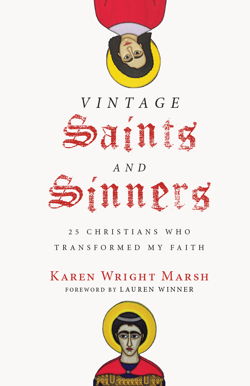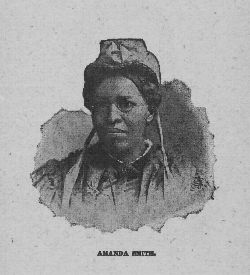 This July, we are so pleased to share book excerpts with you, courtesy of InterVarsity Press. The first book we'll feature is Vintage Saints and Sinners: 25 Christians Who Transformed My Faith by Karen Wright Marsh.
This July, we are so pleased to share book excerpts with you, courtesy of InterVarsity Press. The first book we'll feature is Vintage Saints and Sinners: 25 Christians Who Transformed My Faith by Karen Wright Marsh.
You’ll find some familiar names among the twenty-five people Marsh highlights: C.S. Lewis, Dietrich Bonhoeffer, and Mother Teresa. But you’ll also become acquainted with Amanda Berry Smith, Brother Lawrence, Fannie Lou Hamer, Mary Paik Lee, Aelred of Rievaulx, Juana Ines de la Cruz, and Sophie Scholl. Marsh has pulled together a group of people across time, place, and vocation who have experienced Jesus deeply, but differently.
As Marsh introduces us to her friends in faith, she also introduces us to herself. In her, we meet a woman whose early visions of a future as a Missionary Nurse in Africa led instead to a life of theological work with students, family, and writing. She is the Executive Director of Theological Horizons (which she co-founded with her husband Charles Marsh, a professor of Religious Studies at UVa) where she regularly introduces students to these “vintage saints.”
Each chapter both gives us a snapshot of one person’s life of faith and connects with particular circumstances or questions in Marsh’s life: What is real community? Does fear hold me back from my calling? How do I discern God’s will? What do I do with suffering? How do I find God in the mundane tasks I face today? She’s included a helpful index of primary sources, so if your interest is piqued by a particular story, you can spend some more time with that person.
The encouragement of faithful friends walking alongside us is indeed how we grow in faith, isn’t it? The beauty of these saints is that they don’t need to be in body next to us in order for us to know them. Through Marsh’s introductions, we see their lives lived before God at different times and cultures, and receive an invitation to walk alongside them toward Jesus. Marsh wisely encourages her readers not to take each life as a distant template of an “inaccessible super-saint” but to see these individuals as “perfect companions for real life pilgrimage.”
Vintage Saints is a lovely invitation to meet some new friends in faith, but also to look at our own stories of faith and to identify the people who have been for us faithful companions along the way. Who are your saints? We’d love to hear from you in the comments about vintage saints who resonated with you and other important people you’ve met as you live in response to Jesus.
We get to share excerpts from two chapters with you, so we chose two women whom we hadn’t met before, and who had public voices despite their gender, beginnings, and cultural contexts. As fellow women seeking to follow God’s calling in academic work and faithful witness, we hope you enjoy meeting them.
— Andrea Moller Bridges
Our next introduction: Meet Amanda Berry Smith, an evangelist in an era when women weren’t evangelists — especially women born into slavery.
You can enjoy reading about the life of Juana Inez de la Cruz in the first excerpt of this series. You might also enjoy listening to our interview with Karen Marsh.

Amanda Berry Smith: Lean In, Lean on
What would you do if you weren’t afraid? It would seem a cruel question to ask of Amanda Berry Smith, born into slavery, desperate poverty, danger, racism, and misogyny; she had every good reason to be afraid. Yet through her fear, Amanda Berry Smith leaned fully into God’s power and presence. She stood up, trembling, and preached the gospel to people of all races. She traveled the world as an evangelist. She was a woman who knew what it took to change the world — and she did it.
 Amanda began life in captivity in 1837. Her father, Samuel Berry, enslaved on a neighboring Maryland farm, made brooms late into the night to purchase his family’s freedom. They moved across the border to York, Pennsylvania, where the Berry house was a station of the Underground Railroad. One night, slave trackers burst in; they beat up Samuel and stabbed Amanda’s mother. When freeborn sister Frances went to visit an aunt in Maryland, she was captured and sold. Somehow Amanda earned the fifty dollars to buy Frances back.
Amanda began life in captivity in 1837. Her father, Samuel Berry, enslaved on a neighboring Maryland farm, made brooms late into the night to purchase his family’s freedom. They moved across the border to York, Pennsylvania, where the Berry house was a station of the Underground Railroad. One night, slave trackers burst in; they beat up Samuel and stabbed Amanda’s mother. When freeborn sister Frances went to visit an aunt in Maryland, she was captured and sold. Somehow Amanda earned the fifty dollars to buy Frances back.
Amanda, with only three months of formal education, tells her story in an autobiography, The Story of the Lord’s Dealings with Mrs. Amanda Smith, the Colored Evangelist: Containing an Account of Her Life Work of Faith, and Her Travels in America, England, Ireland, Scotland, India, and Africa as an Independent Missionary. (You can’t buy it at your local bookseller, so save yourself the trip. Smith’s memoir might be lost forever if it weren’t for the online archives of the University of North Carolina.)
Reading Amanda’s obscure book, we get an inside look at a vulnerable woman’s life of privation, hunger, ill health, and intense stress. She barely survives the rigors of manual labor, sweating over laundry for only pennies a day. Amanda endures two disastrous marriages. She grieves the early deaths of four of her five children; when her son Willy dies simply for lack of medicine, she doesn’t have the twenty dollars for his funeral. Amanda speaks frankly of her constant struggles with fear. “I always had a fear of white people,” she writes, a trepidation borne out in daily experiences of prejudice. In Amanda’s telling, it is the doing of Satan at her side, hissing words of self-doubt, deception, and distress. Satan brings the cold dread that holds her captive.
What would you do if you weren’t afraid? Above security or health, young Amanda desperately desires to experience the immediate, living power of God. She leans in to receive the Spirit and makes a daring vow, “I will pray once more, and if there is any such thing as salvation, I am determined to have it this afternoon or die.” In church one day, she receives, at her core, the sanctifying presence of the Holy. She describes the feeling: wonderfully strange yet glorious. She feels a hand, ineffable, press gently on her head. A power moves, rolls down, and covers her like a great cloak.
Amanda’s spiritual encounter leaves her feeling elated, gentled, peaceful, and powerful. As soon as the ecstatic young woman leaves the church, fear threatens her newfound joy. There ahead of her are three leading sisters from her church, promenading up Green Street as if all godly wisdom dwells with them. As Amanda approaches, they whisper together. Are those respectable church ladies gossiping about her? Will Amanda approach them to declare the glorious things that God has just done?
She hears the devil mocking her timidity and, shaken, she falters. Then, unexpectedly, God surprises her with boldness. I love how Amanda tells the story: “I don’t know why, but O I felt mighty, as I came near those sisters.” Unashamed, Amanda blurts out the good news: the Lord has sanctified my soul! The women are speechless as Amanda strides on by, swinging her arm like a boy. Amanda writes, “I suppose the people thought I was wild, and I was, for God had set me on fire! ‘O,’ I thought, ‘if there was a platform around the world I would be willing to get on it and walk and tell everybody of this sanctifying power of God!’”
From that day forward, Amanda was propelled by passion for two things: to know God and to tell others about him. At that time, women were not welcome in pulpits, and certainly not black women. But in a vision, Amanda saw two fiery letters spelling out the command GO. So she preached and sang, dressed plainly in black, gray, and white. Church ladies couldn’t silence her anymore.
Amanda recounts her troubles with the formidable Brother Turpin, a fierce minister who opposed her public preaching. In anticipation of Sunday’s worship service, she was laid low by worry. Amanda spent a Friday in fasting and prayer, though Satan tormented her with discouraging accusations. At 2:00 that afternoon, she took her Bible and knelt down. “Oh! Lord, show me what is the matter. Why is this darkness in my mind?” she prayed. The Spirit directed her to read and Amanda recalls, “I opened my Bible, and my eyes lighted on these words: ‘Perfect love casteth out fear. He that feareth has not been made perfect in love.’ Then I saw what was the matter. Fear!”
Fear. Yes, fear is the matter. So what am I afraid of? I tear off a sheet of notebook paper and begin to scribble. I’m afraid of illness, weakness, of getting old. I’m afraid to lose my husband or my children. I’m afraid to give up my financial security and my comfortable home. I’m afraid of what other people think of me, of their disapproval or hurt feelings. I’m afraid to ask for what I want. I’m afraid to take risks.
I’m making good headway on my fear list until I glimpse myself through Amanda’s eyes. I see an advantaged, educated, healthy, accomplished twenty-first-century white woman in possession of a family, a career, and a Volvo station wagon. In that moment I am deeply ashamed of my fear. Compared to Amanda’s, mine looks a whole lot like indulgent selfishness. I sit with that feeling.
What would you do if you weren’t afraid? Amanda was called to preach but she was terrified, and for good reason. So she prayed for help: “Oh! Lord, . . . give me complete victory over this fear.” The answer came in silence. Circumstances didn’t change and there was no “especial manifestation,” but Amanda had a deep sense that God had delivered her — and she praised him.
— Adapted from Vintage Saints and Sinners by Karen Wright Marsh. Copyright (c) 2017 by Karen Wright Marsh. Published by InterVarsity Press, Downers Grove, IL.
If you enjoyed this excerpt, consider purchasing Karen's book using the 40% off discount code (including free U.S. shipping) that InterVarsity Press is offering readers of The Well: WELL4513. (Good through August 31, 2018 on the title Vintage Saints and Sinners.)